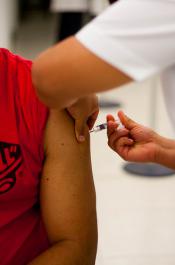Scientists are working on vaccines that spread like a disease. What could possibly go wrong?
By Filippa Lentzos, Guy Reeves,
Bulletin of the Atomic Scientists
| 09. 18. 2020
Once a COVID-19 vaccine is approved for public use, officials around the world will face the monumental challenge of vaccinating billions of people, a logistical operation rife with thorny ethical questions. What if instead of orchestrating complicated and resource-intensive campaigns to vaccinate humans against emerging infectious diseases like COVID-19, we could instead stop the zoonotic diseases that sometimes leap from animals to people at their source? A small, but growing number of scientists think it’s possible to exploit the self-propagating properties of viruses and use them to spread immunity instead of disease. Can we beat viruses like SARS-CoV-2, the novel coronavirus, at their own game?
A virus that confers immunity throughout an animal population as it spreads in the wild could theoretically stop a zoonotic spillover event from happening, snuffing out the spark that could ignite the next pandemic. If the wild rats that host the deadly Lassa virus, for example, are vaccinated, the risks of a future outbreak among humans could be reduced. For at least 20 years, scientists have been experimenting with such self-spreading vaccines, work that continues...
Related Articles
By Scott Solomon, The MIT Press Reader | 02.12.2026
Chris Mason is a man in a hurry.
“Sometimes walking from the subway to the lab takes too long, so I’ll start running,” he told me over breakfast at a bistro near his home in Brooklyn on a crisp...
By Diaa Hadid and Shweta Desai, NPR | 01.29.2026
MUMBRA, India — The afternoon sun shines on the woman in a commuter-town café, highlighting her almond-shaped eyes and pale skin, a look often sought after by couples who need an egg to have a baby.
"I have good eggs,"...
By George Janes, BioNews | 01.12.2026
A heart attack patient has become the first person to be treated in a clinical trial of an experimental gene therapy, which aims to strengthen blood vessels after coronary bypass surgery.
Coronary artery bypass surgery is performed to treat...
By Staff, ScienceDaily | 01.05.2026
Scientists at UNSW Sydney have developed a new form of CRISPR technology that could make gene therapy safer while also resolving a decades-long debate about how genes are switched off. The research shows that small chemical markers attached to DNA
...




